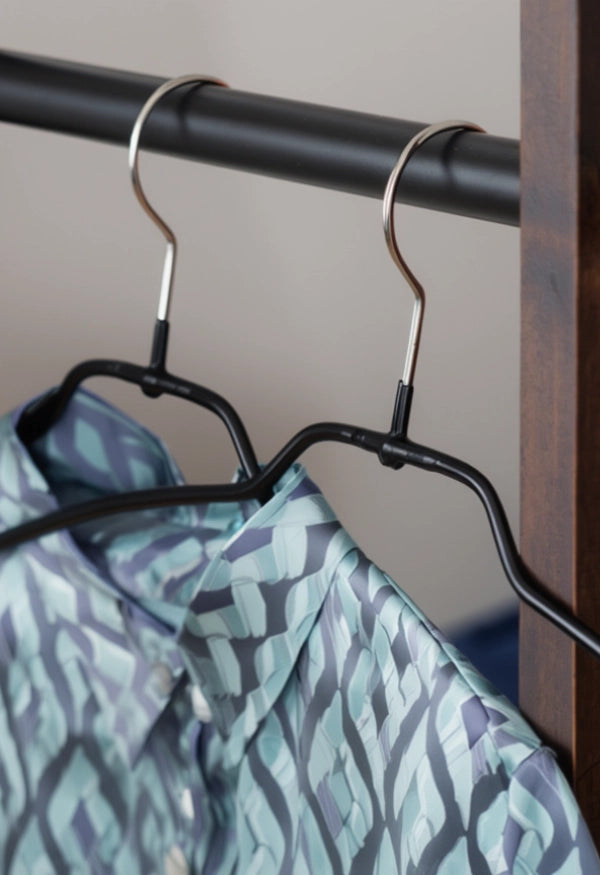Your Cart is Empty
Invoice payment available | Free shipping from €69 | DHL in 2 days
Invoice payment available | Free shipping from €69 | DHL in 2 days
All hangers
Designer hangers
Plastic-free living: 10 practical tips for everyday life
August 10, 2023 3 min read

Plastic-free living: 10 practical tips for everyday life
In a world where plastic waste is becoming an increasingly urgent environmental problem, the trend toward plastic-free living is gaining momentum. Reducing our plastic consumption undoubtedly has a positive impact on our environment. In this article, we'll share 10 practical tips for a plastic-free life.
Tip 1: Use reusable shopping bags
The first step toward a plastic-free life is to avoid single-use plastic bags when shopping. Invest in reusable shopping bags made of fabric or other environmentally friendly materials.
Tip 2: Switch to reusable water bottles
Single-use plastic bottles are one of the main sources of plastic pollution. Instead, use reusable stainless steel or glass water bottles to avoid single-use plastic bottles.
Tip 3: Buy unpackaged
Look for packaging-free stores or shop at markets where you can buy food without plastic packaging. Use your own containers and cloth bags.
Tip 4: Prefer homemade snacks and meals
By cooking at home more often and taking snacks with you in reusable containers, you reduce the need for packaged foods and plastic packaging.
Tip 5: Choose sustainable hygiene products
Avoid plastic in your bathroom by switching to reusable products such as menstrual cups, washable makeup remover pads and cloth diapers for babies.
Tip 6: Implement zero waste in the bathroom
Avoid single-use products like cotton swabs and disposable razors and instead use reusable alternatives to reduce plastic consumption. Also reduce plastic waste in the bathroom by switching to bars of soap, shampoo bars, and solid toothpaste. Avoid products in single-use plastic packaging.
Tip 7: Conscious consumption
Before you buy something, ask yourself if you really need it. Avoid impulse purchases that can lead to unnecessary plastic waste. Instead, buy high-quality products that last longer, rather than replacing inferior ones more frequently.
Tip 8: Repair instead of throwing away
If something breaks, try to repair it instead of throwing it away. This not only reduces waste but also promotes a sustainable mindset.
Tip 9: Look for plastic-free packaging
When shopping for groceries, look for plastic-free packaging. Choose glass, paper, or cardboard instead of plastic whenever possible.
Tip 10: Use plastic-free alternatives

Replace single-use plastic products with sustainable alternatives. For example, use beeswax wraps instead of cling film and stainless steel straws instead of plastic ones.
An often overlooked aspect of a plastic-free lifestyle is the choice of hangers. Replace plastic hangers with eco-friendly options like wooden or metal hangers. These alternatives are durable, sustainable, and gentle on your clothes.
Our tip:
Have you heard of our new MAWA C-Cycle? It's made from natural fibers derived from plant residues. Not only is it sustainable, but it's also just as good as our other MAWA hangers in terms of design and functionality!

Fun Fact: Longest plastic-free trip around the world
Have you ever heard of Jean-Michel Cousteau? He is the son of the famous oceanographer Jacques Cousteau. In 2009, he embarked on a remarkable adventure: a plastic-free trip around the world. During this journey, he completely eliminated the use of single-use plastic products such as bottles, bags, and packaging. Instead, he used reusable containers, cloth bags, and glass bottles. Over 110 days, he showed the world that life without single-use plastic is possible, even while traveling to different countries and cultures. His actions inspired many people to rethink their own plastic consumption and make more sustainable choices. This fun fact illustrates that with determination and commitment, amazing changes are possible, even on a global scale.
Conclusion:
Transitioning to a plastic-free lifestyle requires commitment and conscious choices. Even everyday items play a role in protecting our environment. It's an example of how small changes in our lives can make a big difference for the environment. With these 10 tips, you can make a significant contribution to reducing your carbon footprint. Every small action counts, and together we can create a more positive future for our planet.
Did you enjoy this blog post? Then sign up for our newsletter and never miss a news update.
MAWA Newsletter
Register now and get 15% off your next order:

Classic design & perfect function
✓ Space-saving for complete outfits
✓ High load capacity for heavy clothing
✓ Simple design for a tidy look
Discover our new universal coat hanger Silhouette FS











